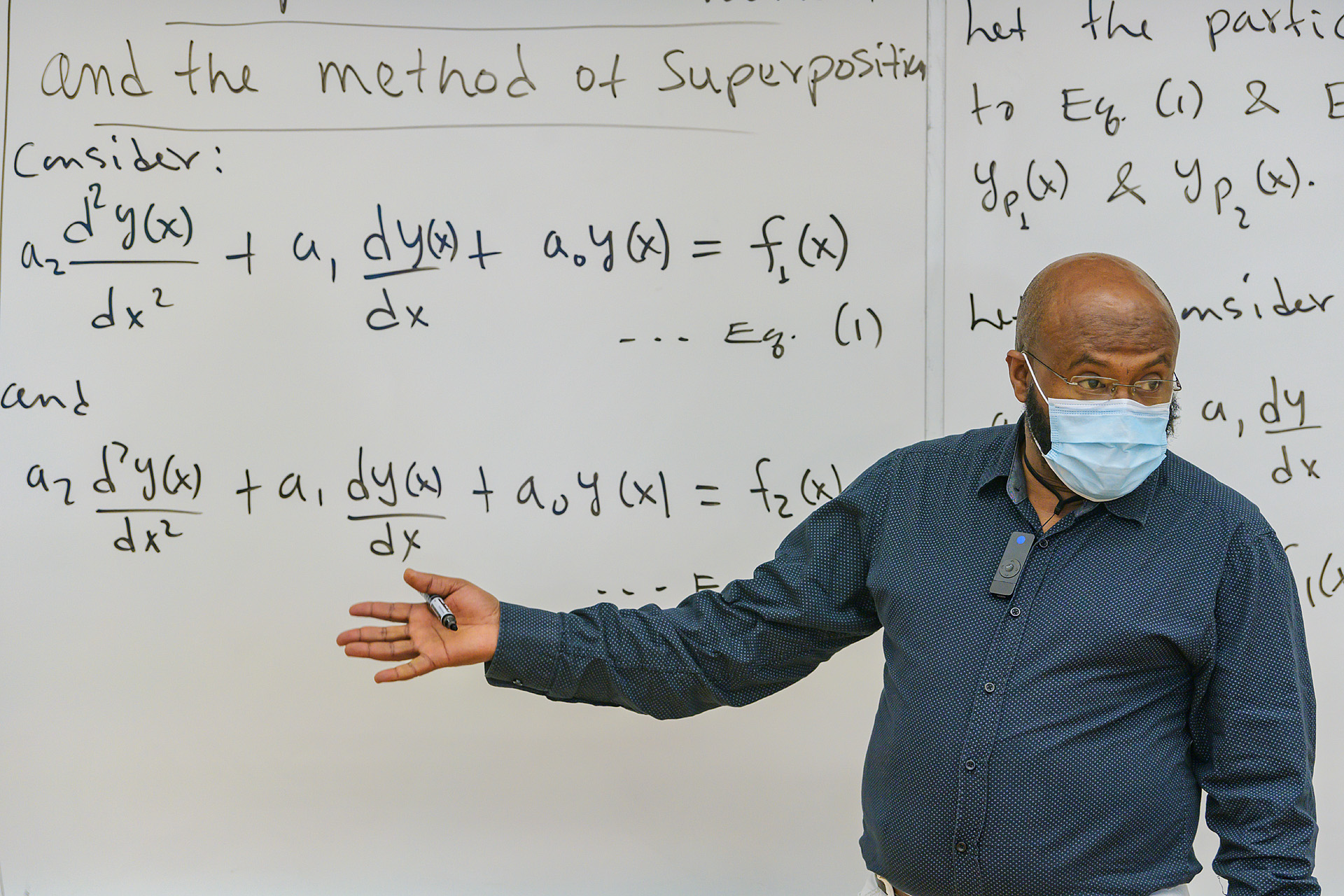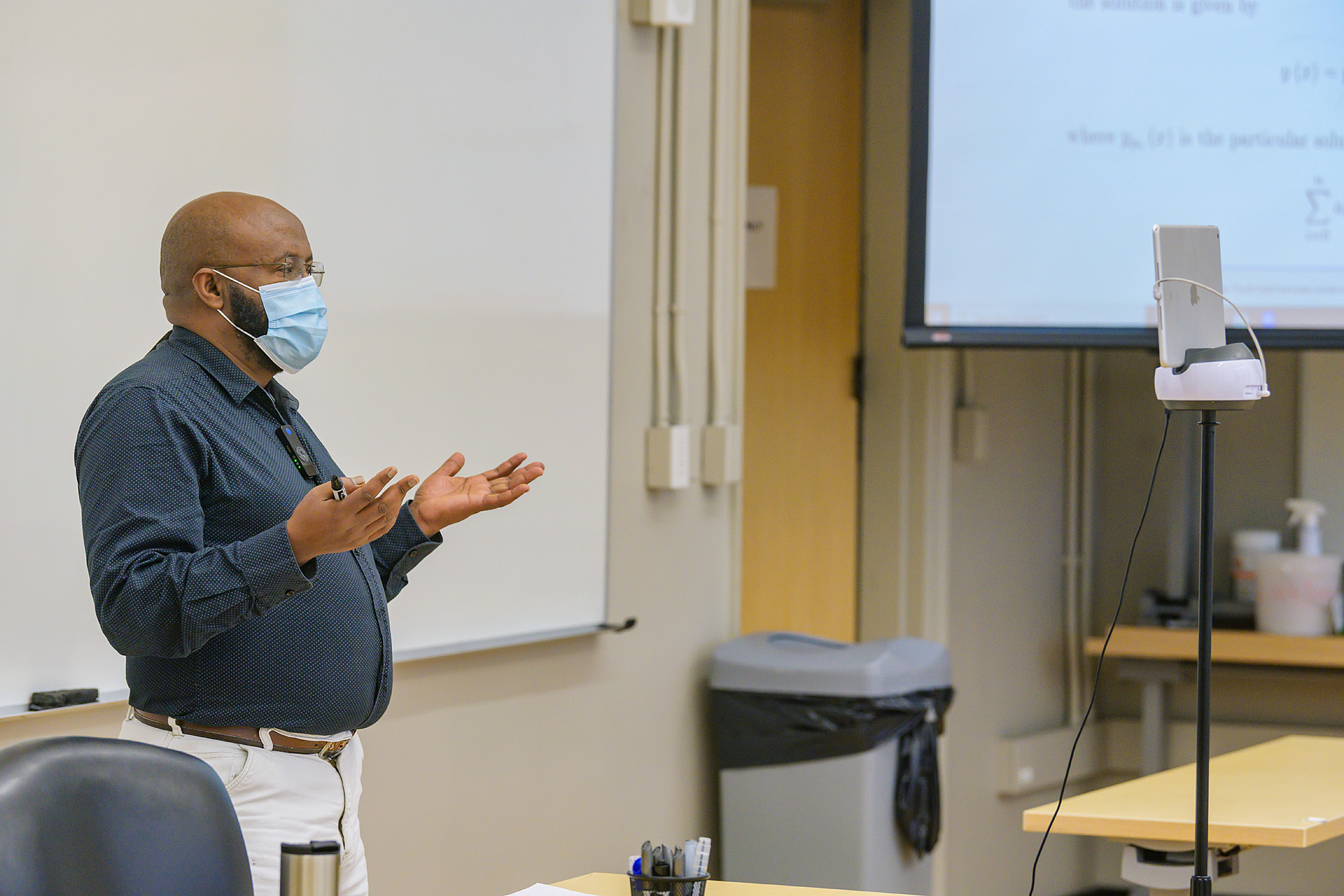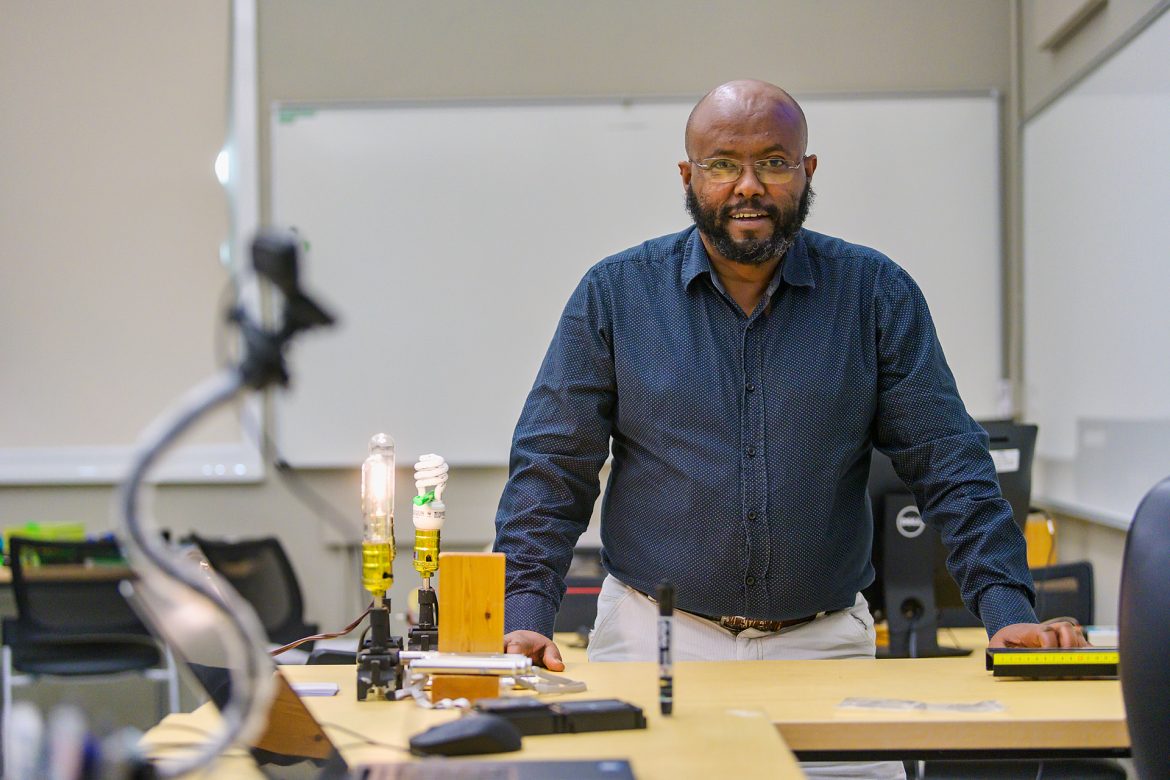When the onset of the COVID-19 pandemic directly impacted the MTSU campus during the 2020 spring break, technology-savvy Daniel Erenso became creative and did something out of the norm.
The Department of Physics and Astronomy professor, now in his 17th year at the university, converted his garage into a classroom environment for remote learning during the lockdown for two upper-division courses for physics majors.
That’s not all Erenso, a theoretical physicist by training who simultaneously evolved into an experimental physicist through the years, accomplished during this strange year.

Daniel Erenso, Physics & Astronomy faculty, in Wiser-Patten Science Hall. (Photo: Andy Heidt)
With the COVID crisis still affecting MTSU in the summer, Erenso began writing a textbook for remote learning to open up previously canceled classes. His idea was shared to Provost Mark Byrnes by department Chair Ron Henderson, who has asked Erenso to train fellow faculty members with this method. The book has been accepted for expedited publication by the Institute of Physics, a popular European publisher, he said.
Erenso, 49, a Christiana, Tennessee, resident, is designing the 400-page book, “Real and Virtual Lab for Introductory Physics II,” to be utilized online because of embedded links for students to visit websites for their simulated labs. It met a January 2021 deadline and is now in production.
Erenso began producing several YouTube videos for introductory Physics II availability to students and the public for the fall semester. A trial lecture from his makeshift classroom can be found here. An intro to Physics II video clip about “magnetic field” from the fall semester can be found here.
Erenso, a respected member of the physics faculty, said 2020 was “very challenging and exhausting.” This included fall finals for his students, then meeting book project deadlines while teaching this semester.
“I am very much looking for things to go back to normal,” he added.
As for the garage classroom to continue in the spring semester, Erenso said he wanted “to figure out how to deliver material to students without losing the on-ground feeling” — and with only a week to make it happen.
Erenso purchased and mounted six, 8-by 4-foot dry erase wipe boards and a Swivl robot designed for an iPad, with a camera to automatically capture him speaking in whatever direction he chooses to move around in the “new,” remote classroom. He uses blue patches to help with glare from lighting.
Erenso nicknamed it “Anticov,” sharing the name with his freshmen and second-year students early in the semester.
Regarding facing and conquering coronavirus issues, Erenso’s optimistic viewpoint is this: “Challenges open the door to new opportunities and opportunities lead to rewards,” he said.
Erenso communicates with students and their questions quickly by text or by phone. He made “a lot of experiments to make sure they are well-suited for students,” he said.
In the extra spring break week last March, several students volunteered to remotely observe Erenso prepare for his online classes, making sure he didn’t leave anything out.
“My main goal during the pandemic was to make sure students did not miss things,” he said.

Daniel Erenso, Physics & Astronomy faculty, in Wiser-Patten Science Hall. (Photo: Andy Heidt)
Fulbright award leads to ‘recruits,’ research advances
Erenso’s prestigious Fulbright Teaching/Research award — he taught two semesters and performed quantum optics research at Addis Ababa University, his alma mater in Ethiopia — led to him inviting two Addis Ababa students to pursue physics graduate research work at MTSU.
Erenso’s prestigious Fulbright Teaching/Research award — he taught two research MTSU Physics and Astronomy hosted Endris Mohamed, who defended his thesis and graduated with his doctorate in December 2019, and Mulugeta Seta, who Erenso anticipates defending his thesis and graduating within a year. Erenso mentors both remotely during COVID.
“This collaborative research has focused on the effectiveness of various curative and noncurative therapies used to treat hemoglobin disorders, specifically sickle cell disorders and various types of cancer, using a laser trapping technique,” he said.
“Employing this technique, I have been studying living cells, particularly human red blood cells and various types of cancer cells, to identify new biophysical and biochemical properties of a living cell at the cellular, molecular and atomic levels,” he added. “The main goal of such work is to develop better therapy predictors, diagnoses and treatments in hemoglobin disorders and various types of cancers.”
This has led to recent “exciting and puzzling new physical processes that may be applicable in diagnostic medicine and electromagnetic energy generation and harvesting,” Erenso said.
“In the biomedical optics lab at MTSU, we are able to annihilate a living matter and transform it into energy,” he added. “Using tens of microliters of blood or cancer cells, it is possible to generate intense electromagnetic radiation. We hypothesize a spectroscopic analyses of this emitted electromagnetic radiation can uncover the biochemical and biophysical properties of cells in a whole different way.”
COVID has not slowed his research. “Data is still being analyzed and manuscripts are being written for publication,” he said. When Wiser-Patten Science Building was renovated, with leftover funds, Erenso “proposed a lot of things to take my research to the next level.”
A high-powered ultraviolet laser and an advanced microscope — for laser trapping and spectroscopy to study the treatment of cancer cells — were requests that were fulfilled.
The original book
Erenso’s “other book” has been in the works since 2003, about the time he began teaching at MTSU. It is a six-volume book in Theoretical Physics. The first volume, titled “Theoretical Physics Volume I: Mathematical Physics” which is about 700-pages designed for three-semester course, is due in April 2021, but he may request an extension.
“Every year, I have been changing it up and improving it,” he said. “I acted on it after being contacted by this publisher in spring 2019. It is a combination of this course and four other courses. I sent them the link. They sent me a proposal.” Erenso took a sabbatical in fall 2019 to work on the project.
Erenso has many accolades, peer-reviewed publications and international presentations to his credit. He was nominated for the2020 American Physical Society Distinguished Research Award, but did not receive the honor .
To learn more about Erenso, who embraces technology year-round, not just in times of COVID, and the physics courses he teaches, visit here.
— Randy Weiler (Randy.Weiler@mtsu.edu)


COMMENTS ARE OFF THIS POST